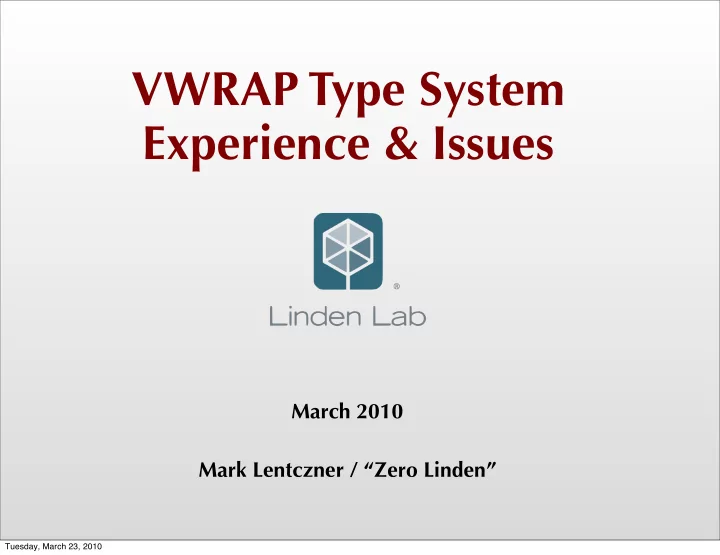

VWRAP Type System Experience & Issues March 2010 Mark Lentczner / “Zero Linden” Tuesday, March 23, 2010
Experience Report Tuesday, March 23, 2010
Tuesday, March 23, 2010 Time Line 2005 I n i t i a l D B i e n s a i g r y n & & N I m o p 2006 t l a . t i o n S e r . 2 n d D e X s M i g L n S & 2007 e r I i m a l p i z l . a t i o n U s e i n m e s s a 2008 g e s y s t e m B a s i s f o r O G P 2009 d r a f t s F i r s t I D ( I E T F 7 5 ) 2010
Implementations C++: Linden Lab C#: OpenMetaverse Haskell: Linden Lab Java: Linden Lab, University of St. Andrews JavaScript: Linden Lab Perl: Linden Lab PHP: Linden Lab, SignpostMarv Python: Linden Lab Ruby: Linden Lab Tuesday, March 23, 2010
Usage Code: 9% of modules in LL main codebase use LLSD (~8k modules, ~3M lines of code) Tuesday, March 23, 2010
Usage Counts: 253k log messages / minute daily peak (notation) 9.7M objects created / day (XML) Tuesday, March 23, 2010
Usage Data Volume: 6.4 TiB / day for 2M teleports average of 3.3MiB each (binary) big LLSD! 55.7 TiB / day for 749k simulation checkpoints gzip’d to 42% of original (XML) Tuesday, March 23, 2010
Pain Points Content Negotiation Unicode Strings vs. XML Mixing LLSD and non-LLSD Documentation Validation Big data sets Tuesday, March 23, 2010
Issues Tuesday, March 23, 2010
Types: Date Range The range of dates is currently bounded: “Data of type Date may have the value of any time in the from January 1, 1970 though at least January 1, 2038, to at least second accuracy.” Is this a worry? Tuesday, March 23, 2010
Encoding: JSON Subtlety 1) RFC 4627 vs. ECMA-262 2) RFC 4627’s JSON-text vs. ECMA-262’s JSONvalue 3) String literals are escaped UTF-16, not Unicode! U+1D11E ( 𝄟 ) is encoded in JSON as: "\ud834\udd1e" Tuesday, March 23, 2010
Encoding: XML Base64 1) The encoding attribute is defaulted to base64 , it is not #REQUIRED 2) Which alphabet? RFC 4648 § 4. Base 64 Encoding 3) Linebreaking, Padding and Non-Alphabet RFC 4648 § 3. Implementation Discrepancies Tuesday, March 23, 2010
LLIDL: REST vs. HTTP 1) Clear community dislike of binding to HTTP 2) Agreement on focus on REST semantics 3) Which REST like operations do we support? Operational POST <- -> Readable GET << Read/Write GET / PUT <> Read/Write/Deletable GET / PUT / DELETE <x> Tuesday, March 23, 2010
LLIDL: Events An event, as cast into REST, would be like a request with no response. This does seem to map onto the communication needs of VWRAP. Do we add this? Perhaps: Event POST ? >> Tuesday, March 23, 2010
LLIDL: Semantics of Matching LLIDL describes shapes LLSD describes defaulting and conversion What constitutes conformance of an LLSD value to an LLIDL description? One approach: match(actual) -- matches structurally and all conversions are valid (non-defaulted) valid(actual) -- matches structurally though defaulted or additional data is acceptable has_additional(actual) -- has additional data has_defaulted(actual) -- has defaulted data incompatible(actual) -- the value is incompatible Tuesday, March 23, 2010
LLIDL: Stand Alone Values There a need to be able to reference (and check conformance) for individual values. The named type facility serves this purpose for now. Tuesday, March 23, 2010
LLIDL: Path Arguments Astute readers will have noticed the addition of query argument specifications to LLIDL (the ?? syntax). While not strictly part of the current VWRAP usage, internally the need for specifying the query arguments to a resource was pressing. The need for path arguments is similar, though at present, LLIDL doesn’t consider the URL to access a resource. Tuesday, March 23, 2010
VWRAP Foundation Issues March 2010 Mark Lentczner / “Zero Linden” Tuesday, March 23, 2010
Additions: Minor nit: “Capability Host” Minor nit: Resource Base URI Medium issue: Required Serialization Formats Tuesday, March 23, 2010
Issues Tuesday, March 23, 2010
Seed Capability Format In draft: %% seed -> { capabilities: [ string, ... ] } <- { capabilities: { $: uri } } But should it be? %% seed -> { capabilities: [ string, ... ] } <- { capabilities: [ &cap, ...] &cap = { name: string, loc: uri } Tuesday, March 23, 2010
Event Queues 1) Are events to be handled differently than other resource types? 2) How should server invoked resources be implemented? 3) Is the current long-poll queue mechanism good enough for now? Tuesday, March 23, 2010
Capability Host The “capability host” is responsible for both granting and proxying Should split out into two: “granting host” “proxying host” Tuesday, March 23, 2010
Resource Name Base URI Currently: http://xmlns.secondlife.com/capability/name Propose something like: urn:vwrap:res: Tuesday, March 23, 2010
Serialization Currently “XML and JSON ... MUST be supported” Is there a point to forcing everyone to do both? We could put the burden on: just providers? just consumers? How does that work in our more symmetric world? Tuesday, March 23, 2010
Recommend
More recommend